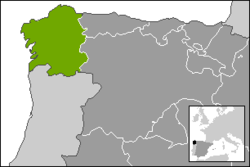
Día Nacional de Galicia
Encyclopedia



Nation
A nation may refer to a community of people who share a common language, culture, ethnicity, descent, and/or history. In this definition, a nation has no physical borders. However, it can also refer to people who share a common territory and government irrespective of their ethnic make-up...
of Galicia celebrates its national holiday. It falls on the 25th of July.
It is also called Día da Patria Galega ("Day of the Galician Fatherland"), or simply Día de Galicia / Día de Galiza ("Galicia's Day"). Yet, the official full denomination is the "National Day of Galicia", as established by the Galician government
Xunta de Galicia
The Xunta de Galicia is the collective decision-making body of the government of the autonomous community of Galicia, composed of the President, the Vice-President and the specialized ministers ....
in 1979
History of the celebration
The origins of the celebration can be traced back to 1919, when the Assembly of the GalicianistGalicianism (Galicia)
Galicianism is a political ideology of nationalist character whose objective is the defence of Galicia and its culture by the means of the establishment and strengthening of its own institutions.-Origins:...
organization Irmandades da Fala
Irmandades da Fala
The Irmandades da Fala was a Galician nationalist organization active between 1916 and 1936.It was the first political organization of Galicia that only used the Galician language.-Origin:...
met in the Galician capital, Santiago de Compostela
Santiago de Compostela
Santiago de Compostela is the capital of the autonomous community of Galicia, Spain.The city's Cathedral is the destination today, as it has been throughout history, of the important 9th century medieval pilgrimage route, the Way of St. James...
. It was then decided to celebrate the National Day on the 25th of July of the following year. The date was chosen as it is the day dedicated to Saint James, patron saint
Patron saint
A patron saint is a saint who is regarded as the intercessor and advocate in heaven of a nation, place, craft, activity, class, clan, family, or person...
of both Galicia and the Galician capital city.
It was celebrated openly until the Francoist dictatorship (1939-1977), when any display of non-Spanish nationalism was prohibited. During that time the National Day would still be celebrated as such by the Galician emigrant communities abroad. In Galicia, the Galicianists would gather with the pretext of offering a Mass
Mass (liturgy)
"Mass" is one of the names by which the sacrament of the Eucharist is called in the Roman Catholic Church: others are "Eucharist", the "Lord's Supper", the "Breaking of Bread", the "Eucharistic assembly ", the "memorial of the Lord's Passion and Resurrection", the "Holy Sacrifice", the "Holy and...
for Galician poetess and literary icon Rosalia de Castro
Rosalía de Castro
María Rosalía Rita de Castro , was a Galician romanticist writer and poet.Writing in the Galician language, after the Séculos Escuros , she became an important figure of the Galician romantic movement, known today as the Rexurdimento , along with Manuel Curros Enríquez and Eduardo Pondal...
. Curiously enough, the Francoist regime institutionalized the religious celebration of Saint James as the "patron saint of Spain".
Nonetheless, from 1968 Galicianists attempted to celebrate the day in Compostela, still during the dictatorship. The Partido Socialista de Galicia ("Galician Socialist Party") and the Unión do Povo Galego ("Galician People's Union") called for public political demonstrations every 25th of July. These demonstrations would invariably result in riots with the Spanish police. Even during the first years of democracy, after 1977, any demonstration organised by the Asemblea Nacional-Popular Galega and the BN-PG (later transformed into the Galician Nationalist Bloc) would still be forbidden. It is only during the mid 1980s when the National Day started to, gradually, be celebrated with some degree of normality. Although, the events from the late 1960s onwards transformed the National Day celebrations into a date with deep political implications. At present, Galician political parties (mostly nationalist, but not only) organise large demonstrations at the capital city and/or a number of activities to commemorate the day.
The political and institutional activities are normally all based in Santiago de Compostela
Santiago de Compostela
Santiago de Compostela is the capital of the autonomous community of Galicia, Spain.The city's Cathedral is the destination today, as it has been throughout history, of the important 9th century medieval pilgrimage route, the Way of St. James...
, and the day is an official public holiday celebrated with solemnity by the Galician government. Apart from that, a number of festivities take place from the night of the 24th until high hours in the morning of the 26th, celebrated by many.
External links
- A history of the Día Nacional de Galicia (in Galician)
See also
- Galician PeopleGalician peopleThe Galicians are an ethnic group, a nationality whose historical homeland is Galicia in north-western Spain. Most Galicians are bilingual, speaking both their historic language, Galician, and Castilian Spanish.-Political and administrative divisions:...
- History of GaliciaHistory of GaliciaThe Iberian Peninsula has been inhabited for at least 500,000 years, first by Neanderthals and then by modern humans.-Megalithic culture:Galicia, northern Portugal, Asturias, western León, and Zamora formed a single megalithic area since the Neolithic and Chalcolithic Ages, around 4500–1500...
- Timeline of Galician historyTimeline of Galician History-Paleolithic:*200th millennium BC – In the Paleolithic period the Neanderthal Man enters the Iberian peninsula.*70th millennium BC**Neanderthal Mousterian culture.**Beginning of the Last Ice Age.*40th millennium BC**Beginning of the Upper Paleolithic....
- Galician nationalismGalician nationalismGalician nationalism is a political movement arguing for the recognition of Galicia as a nation. The political movement referred to as modern Galician nationalism was born at the beginning of the twentieth century from the idea of Galicianism.- Ideology :...
- Irmandades da FalaIrmandades da FalaThe Irmandades da Fala was a Galician nationalist organization active between 1916 and 1936.It was the first political organization of Galicia that only used the Galician language.-Origin:...

